
*
One of the longest-running musical partnerships in Broadway history began 56 years ago in 1956 when Richard Maltby, Jr. and David Shire, both of them sons of celebrated orchestra leaders, arrived at the Yale University campus on the same day.
This remembered math brings a wince to the eyes of Maltby (the Younger — by four months)."I don't like to put that number down," he grumbles. "David says it all the time. He thinks it's great, and I think, 'Shut up.' I have no connection to this number that's attached to my name. I know people who are this age, and they're old people. I haven't tolerated a birthday for ten years." A lyric, or a snit, seems to be coming on.
"We both wanted to write musicals," he recalls, but he also recalls it wasn't exactly a Starting Here, Starting Now sort of thing. "David came from Buffalo and wrote music, and I came from Long Island, by way of Exeter, and wrote book and lyrics, but we didn't hit it off immediately. In fact, I think we did everything possible not to work together. Then we looked around, and there was nobody else."
They certainly "settled" rather spectacularly, if the next few days are any barometer. Closer Than Ever, their sprightly, scattered look at modern times, foibles and heartbreaks (which The New York Times called "one of the half-dozen finest American theatre scores of the last decade"), returns June 20 to the Off-Broadway scene where it ran in 1989-90 — this time to the York Theatre through July, perhaps longer, headlining Jenn Colella, George Dvorsky, Christiane Noll and Sal Viviano.
(Two days earlier, on June 18, their first — and still favorite — Broadway show, Baby, celebrated its third decade with a concert performance at the Lucille Lortel Theatre benefiting the Transport Group Theatre Company. Liz Callaway and Todd Graff, who were Tony-nominated as the youngest of three pairs of prospective parents, hosted the evening, and two dozen of today's Broadway A-list participated. And so did Maltby and Shire, in a talk-back, following the performance.)
| |
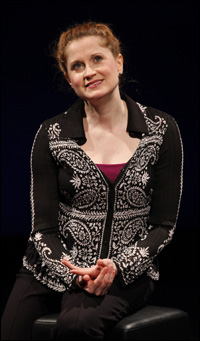 |
|
| Christiane Noll in the York Theatre production of Closer Than Ever. | ||
| photo by Carol Rosegg |
Not only was "The Bear, the Tiger, the Hamster and the Mole" cut from Baby, so too was the character who sang it. "There was a fourth story in Baby about a biology teacher who wanted to have a baby without getting married, so we followed that through. The problem with the character was, once she had sung the song, there was nothing else that the character really needed to say."
"Patterns" and "I Wouldn't Go Back" are the other Baby orphans adopted by Closer Than Ever. There are also tunes cut from Love Match and from a musical with Bill C. Davis that didn't happen, Of the Village Bells. (For the record, for those who know and love the original Off-Broadway cast album, "The Sound of Muzak" was cut this time around — because it seemed dated, Shire said — and replaced with "Dating Again." Not to worry — the rousing opening number, "Doors," is intact.)
| |
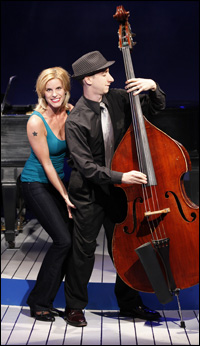 |
|
| Jenn Colella and bass player Danny Weller in the York Theatre production. | ||
| Photo by Carol Rosegg |
Shire, first wed to actress Talia Shire, collaborated with the second Mrs. Shire, singer-actress Didi Conn, on "Another Wedding Song (The First To Be Second)," which they sang at their wedding. "It was not intended to be in a show or anything. It was just a kind of wedding present to ourselves and to the people we invited."
Which comes first with these two — the words or the music? "We work both ways," Shire admits. In other words and music, it depends: If a song is lyric-led, the music accommodates; if it has a strong melodic line (at which Shire shines), words bend.
"Richard likes to have music first whenever he can because he tends to fall into doggerel when he's writing without music. And when I'm setting a lyric, I tend to lose my original idea. Richard likes writing music better than I like writing lyrics."
Adds Maltby: "What we do is discuss the thing. When it hits, David usually writes the melody, then we work over the melody to make sure it's got the character in it. After that, I feel like the lyric's already there — except then I have to go home and write it."
| |
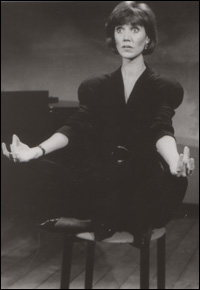 |
|
| Lynne Wintersteller in the original production. | ||
| photo by Carol Rosegg |
The song was half-finished when Maltby left for London to do the lyrics for Miss Saigon and Shire shuffled off to Buffalo to spend time with his elderly dad whose hands had grown so numb he couldn't, for the first time in his life, play the piano. But his son could and, in a passing-the-torch fashion, played him the melody for the fathers' song. When Shire told Maltby this story, the latter said, "That's the second verse!" The lyric changed in mid-creation, from Maltby's father to Shire's.
Shire collaborated on that lyric and also wrote the words to "Back on Base," but mostly he contents himself with just writing music — which extends to film scores as well and film songs like his Oscar-winning "It Goes Like It Goes" from "Norma Rae."
| |
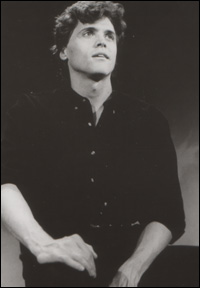 |
|
| Brent Barrett in the original production. | ||
| Photo by Carol Rosegg |
He's a playwright who just happens to rhyme, producing lyrics that are often described as one-act plays. They are eminently actable for singers working from the point of view of a specific character. This character may exist in the musical book he is writing or only for the life of a single song. But they come from the real world, and singers feel fortified when he reveals to them the backstory of what they're singing.
"I tell them where the song came from, who the character was — the reality of the song," he says. "Mostly, the songs come from people — people we knew or things we observed about ourselves or stories that people told us about other people. They told me stories no fiction writer could invent. The only reason they could possibly exist is that they would be true. People have complex lives that we can't imagine."
Consider the hilarious musical rant, "You Want To Be My Friend?" It came from an actress, whose name has conveniently slipped his mind. Her boyfriend was breaking up with her and trying to let her down easy at the same time. One line from her original diatribe is quoted verbatim in the number: "I got enough 'friends!'"
Then there's "There," the lament of a wife whose husband is off in another world far removed from hers. "Well, I didn't have to go very far afield for that one," Maltby sheepishly admits. "I've been accused of that through a couple of marriages."
| |
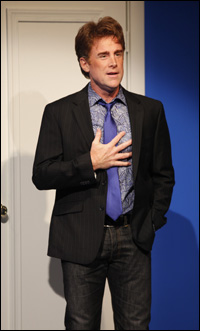 |
|
| Sal Viviano in the York Theatre production. | ||
| photo by Carol Rosegg |
Maltby has a million of 'em. "People tell me stories, and I think, 'That's a song,' so I started collecting these ideas and putting them in this file that I call 'The Urban File.' Every once in a while, I'd take one out, work on it, get a little stanza going and David would write a melody for it, then I'd put it aside and come back later and finish it.
"Suddenly, we had about seven or eight songs, and we played them for Manhattan Theatre Club, which was then planning a revue of songs and sketches. All of them went into a show called Urban Blight. Then, Stephen Scott Smith asked to do a nightclub act at Eighty-Eights with those songs, and they got terrific reviews. That's when David and I decided we should expand those songs into a real show."
Enter Closer Than Ever. And now, 23 years later, enter again — without too much airbrushing, a show still true to the times. "I guess I've come to realize, over a time, that David and I write things that are just not like what other people write," Maltby reflects. "I place no value judgment on that. We just have a different voice."
Check out Playbill Video's visit to the Closer Than Ever rehearsal studio:










